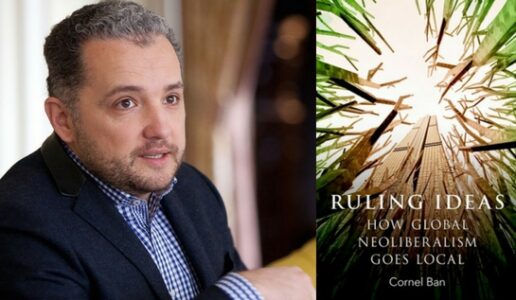Cornel Ban Publishes New Book Ruling Ideas
Cornel Ban, Assistant Professor of International Relations and Co-Director of the Global Economic Governance Initiative, has published a new book with Oxford University Press entitled Ruling Ideas: How Global Neoliberalism Goes Local.
Ruling Ideas challenges conventional explanations of the global diffusion of neoliberalism and emphasizes the agency of local translators. Ban theorizes and empirically tests for the first time the mechanisms that make neoliberal ideas become more radicalized in some countries and more moderate in others and examines how neoliberal hybrids survive crises.
“The book is really critical of ahistorical and excessively broad definitions of neoliberal economics,” Ban said. “It’s true that now even the IMF uses this term but when I started writing it I felt a bit self-conscious. By the mid to late 2000s conceptual inflation, terminological confusion, and fatigue set in among scholars using this concept. Many felt that the term had become less analytical, a grab bag of definitions that associate it with a plethora of social facts, from political ideology to a technocratic list of policies and even models of capitalism.The book avoids this problem by defining neoliberalism as a set of clear economic theories that economists would recognize plus the policies and institutions that follow from them.”
The book covers the Franco period in Spain and the Ceausescu period in Romania, discusses the economic integration of these countries into the EU and continues through Europe’s Great Recession and the European debt crisis. The broad historical coverage enables a careful analysis of how neoliberalism rules in times of stability and crisis and under different political systems.
“Moderate and radical forms of neoliberalism were not drastically altered by the [2008] crisis because the deck was stacked against change. Inside, for all the political noise and anti-austerity movements, the policy sphere remained stable and populated by the same institutional actors bearing slightly edited versions of pre-crisis ideas about how to manage the state-market relations,” Ban said. “Outside national polities, there were bigger constraints still. Policymakers who thought of pushing the boundaries of neoliberalism felt paralyzed by what was outside: the pressures exerted by desperate competition for capital, the structural power of transnational finance, the financialization of state debt and the effective legalization of macroeconomic decisions. The book showed that in both countries policymakers were reflexive and critical of the dominant policy regime, often using Keynesian ideas, but at the same time they (correctly) anticipated and/or forced to admit that translating their revisionist neoliberalism in practice would prove too costly and consequently they backed off.”
Ban specifies the conditions under which the local translations of neoliberal ideas can turn into actionable policy templates, proposes a new definition of neoliberalism that lends itself to more objective empirical observation and breaks new methodological ground in the existing political science scholarship on diffusion: embeds an unconventional mix of content and network analysis.
Ban will discuss Ruling Ideas during the first installation of the Pardee School Faculty Book Talk Series on Monday, September 19 at 121 Bay State Road.
You can order a copy of Ruling Ideas here.
